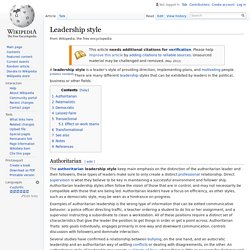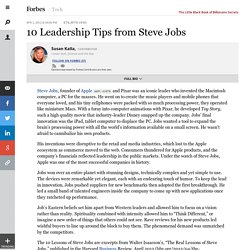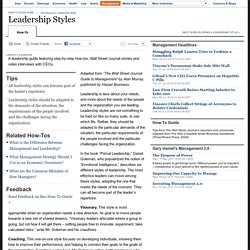

Top Ten Traits of Great Library Leaders. As we approach the end of 2012, I thought I’d get back to my theme for the year – Library Leadership.

In order to be a great leader, a person must possess and demonstrate certain characteristics, or traits of leadership. Here are 10 that should be at the top of anyone’s list who is striving to become a great library leader. I have written before about library leaders needing to be visionary (Being “The Library” Again, Many 21st Century Library Directors Are NOT Librarians, and Go Big or Go Home!). That point can not be over emphasized. In today’s environment of constant change causing an ambiguous future, leaders must be able to create a vision and then share that vision with every member of their library. 10.
The School Library Media Specialist: Overview. The teacher librarian must be a strong leader in the learning community.

This leadership should be reflecting in all aspects of the school library media program. Leadership involves accountability, administration, and advocacy. Accountability. Whether selecting websites for a science pathfinder or purchasing new equipment, the teacher librarian should always be thinking about accountability. The New Librarian: Leaders in the Digital Age. Part of a series of case studies produced by Digital Promise examining the work of members in our League of Innovative Schools.

Click here for more info on the League. To stay up to date on future case studies, sign up for our email newsletter. SLR School Librarians as Technology Integration Leaders V15. School Librarians Must Be Assertive Leaders, Technology Experts. Drew Dudley: Everyday leadership. Phil Jackson's 11 Principle's of Mindful Leadership. Phil Jackson, considered one of the greatest coaches in the history of the National Basketball Association, has won 11 titles as a coach.

The most in NBA history. Eleven Rings is a memoir that, for me, is more about leadership and relationships than basketball. Jackson's principles are worth taking a look at. They support the idea that a leader's job is to build leaders at all levels. You could take back to your organization and put into practice today any one of the following 11 principles: 1. Types of Leadership Styles: An Essential Guide. By Murray Johannsen. (March 9, 2014). Feel free to connect with the author by Linkedin, Google+ or by email. This article lists 20 different leadership styles. With each style is a short definition designed to highlight the essential makeup of each leadership style. Styles Overview. Brewster Kahle: A free digital library. Leadership style. A leadership style is a leader's style of providing direction, implementing plans, and motivating people.

[citation needed] There are many different leadership styles that can be exhibited by leaders in the political, business or other fields. Authoritarian[edit] The authoritarian leadership style keep main emphasis on the distinction of the authoritarian leader and their followers, these types of leaders make sure to only create a distinct professional relationship. Direct supervision is what they believe to be key in maintaining a successful environment and follower ship. 10 brey cassiano. 13 Common Leadership Styles (and When to Use Them) By Kendra Cherry Updated December 03, 2015.

A leadership style refers to a leader's characteristic behaviors when directing, motivating, guiding and managing groups of people. Great leaders can inspire political movements and social change. They can also motivate others to perform, create and innovate. Rita Pierson: Every kid needs a champion. 10 Leadership Tips from Steve Jobs.
Steve Jobs, founder of Apple AAPL +0.87% and Pixar was an iconic leader who invented the Macintosh computer, a PC for the masses.

He went on to create the music players and mobile phones that everyone loved, and his tiny cellphones were packed with so much processing power, they operated like miniature Macs. With a foray into computer animations with Pixar, he developed Toy Story, such a high quality movie that industry-leader Disney snapped up the company. Jobs’ final innovation was the iPad, tablet computer to displace the PC. The New Librarian: Leaders in the Digital Age.
Leadership in a Digital Age. The increasingly digital context brings challenges and opportunities for librarians, library staff, archivists, and museum professionals.

New roles and the competencies required to perform them are evolving. One overriding role for all of us is that of the leader. The complexity of the changes we experience leads to many unfamiliar situations in which deep learning is necessary to successfully work through the problems and challenges. Scholar Warren Bennis calls these “crucible” experiences. Fastcompany. You don’t need an MP3 player, a turntable, or a CD player to listen to Tristan Perich’s new album, Noise Patterns.

All you need is a pair of headphones—"not earbuds," says the composer—and a willingness to hear music in noise. The 34-year-old Perich’s compositions push the border between white noise and electronic music, frequently straddling the two as if the static on your old television started emitting a strangely beautiful pattern of sound. But Perich doesn’t just compose music: His music is the instrument itself. He composes sound in code, carefully stringing together each 1 and 0 to transform numbers into a symphony.
Perich, who studied math, music, and computer science at Columbia and received a masters from NYU's fabled hacking-meets-art Interactive Telecommunications Program, has spent the last dozen years of his life exploring the frontiers of one-bit sound, transforming those lines of 1s and 0s into a living art form. Leadership Styles. Lessons in Leadership A leadership guide featuring step-by-step how-tos, Wall Street Journal stories and video interviews with CEOs.

Adapted from “The Wall Street Journal Guide to Management” by Alan Murray, published by Harper Business. Leadership is less about your needs, and more about the needs of the people and the organization you are leading. Leadership styles are not something to be tried on like so many suits, to see which fits. The Real Leadership Lessons of Steve Jobs. His saga is the entrepreneurial creation myth writ large: Steve Jobs cofounded Apple in his parents’ garage in 1976, was ousted in 1985, returned to rescue it from near bankruptcy in 1997, and by the time he died, in October 2011, had built it into the world’s most valuable company.
Along the way he helped to transform seven industries: personal computing, animated movies, music, phones, tablet computing, retail stores, and digital publishing. He thus belongs in the pantheon of America’s great innovators, along with Thomas Edison, Henry Ford, and Walt Disney. Why Are American Colleges Obsessed With 'Leadership'? - Tara Isabella Burton. Earlier this month, more than 700,000 students submitted the Common Application for college admissions. They sent along academic transcripts and SAT scores, along with attestations of athletic or artistic success and—largely uniform—bodies of evidence speaking to more nebulously-defined characteristics: qualities like—to quote the Harvard admissions website—“maturity, character, leadership, self-confidence, warmth of personality, sense of humor, energy, concern for others and grace under pressure.” Why are American colleges so interested in leadership? On the Harvard admissions website quoted above, leadership is listed third: just after two more self-evident qualities.
So too the Yale website, which quotes former Yale president Kingman Brewster's assessment that “We have to make the hunchy judgment as to whether or not with Yale’s help the candidate is likely to be a leader in whatever he [or she] ends up doing.” What is Leadership? - Leadership Skills Training from MindTools.com. © iStockphotodmitry_7 Discover the qualities that will make you stand out from the crowd. Leaders are people who do the right thing; managers are people who do things right. – Professor Warren G. Bennis The word "leadership" can bring to mind a variety of images. There’s No Such Thing as Library Leadership.
There’s leadership. Library Leadership & Management. What Is Leadership?